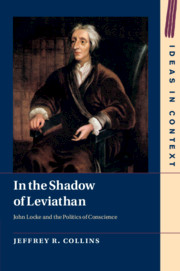Book contents
- In the Shadow of Leviathan
- Ideas in Context
- In the Shadow of Leviathan
- Copyright page
- Dedication
- Contents
- Acknowledgements
- Note on the Text
- Abbreviations
- Introduction
- Chapter 1 John Locke and Interregnum Hobbism
- Chapter 2 The Restoration Projects of Thomas Hobbes
- Chapter 3 Locke and the Restoration Politique
- Chapter 4 Non-domination Liberty in Spiritual Context
- Chapter 5 Locke, Conscience, and the Libertas Ecclesiae
- Chapter 6 Locke and Catholicism
- Chapter 7 Locke and a ‘More Liberal’ Hobbism
- Conclusion
- Bibliography
- Index
- Ideas In Context
Chapter 5 - Locke, Conscience, and the Libertas Ecclesiae
Published online by Cambridge University Press: 07 February 2020
- In the Shadow of Leviathan
- Ideas in Context
- In the Shadow of Leviathan
- Copyright page
- Dedication
- Contents
- Acknowledgements
- Note on the Text
- Abbreviations
- Introduction
- Chapter 1 John Locke and Interregnum Hobbism
- Chapter 2 The Restoration Projects of Thomas Hobbes
- Chapter 3 Locke and the Restoration Politique
- Chapter 4 Non-domination Liberty in Spiritual Context
- Chapter 5 Locke, Conscience, and the Libertas Ecclesiae
- Chapter 6 Locke and Catholicism
- Chapter 7 Locke and a ‘More Liberal’ Hobbism
- Conclusion
- Bibliography
- Index
- Ideas In Context
Summary
Chapter 5 is the lynchpin chapter of this book. It offers contextual analysis of Locke’s most important tolerationist texts: the unpublished ‘Answer to Stillingfleet’ and the famed Epistola de Tolerantia. These works are shown to have moved beyond the idioms of civil religion, monarchical prerogative, and prudential indulgence. They offer a full-blown, rights-oriented defence of religious freedom and free exercise. They justify, potentially, political resistance in defence of these rights. They also offer, for the first time, a Lockean ecclesiology: a positive theory of churches, their autonomy, and ends. In argument and tone the ‘Answer’ and the Epistola dramatically break with Locke’s earlier writings on toleration. This break is presented, from one angle, as a break with the politique tolerationism of Restoration Hobbism. Locke is shown to have developed a ‘non-domination’ account of religious freedom and free exercise. His thinking was no longer subservient to the needs of the state, and indeed his theory of conscience freedom could undermine those interests. This chapter interprets Lockean toleration theory as an emancipation from the civil religion and prerogative-oriented logic of Hobbesian toleration.
Keywords
- Type
- Chapter
- Information
- In the Shadow of LeviathanJohn Locke and the Politics of Conscience, pp. 212 - 270Publisher: Cambridge University PressPrint publication year: 2020

